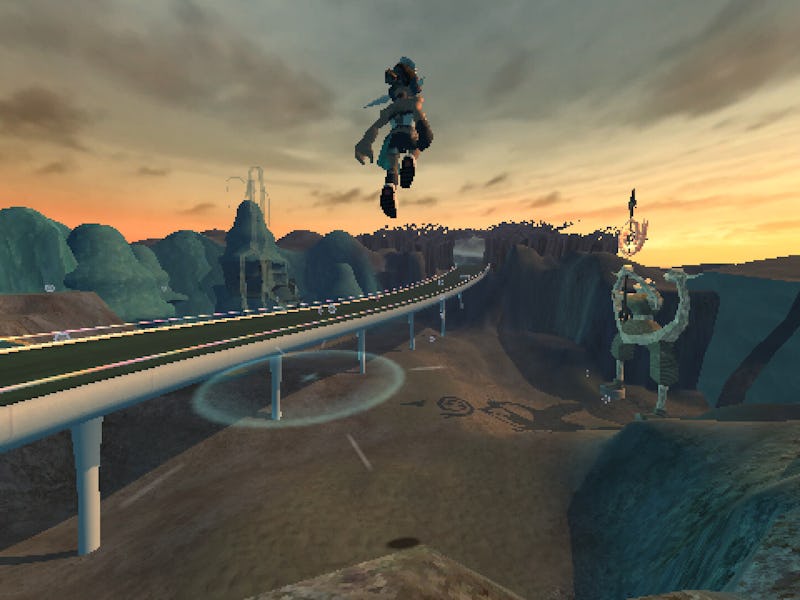
Nostalgia is a powerful force in gaming. As much as the industry demands accelerating technical progress to its own detriment, there’s also endless appeal in throwbacks to earlier eras. Released on August 12, 2019, by Analgesic Productions, Anodyne 2: Return to Dust looks like a throwback to a much earlier era, but hiding under its pixelated surface is one of the most ambitious and nuanced games in recent memory.
Anodyne 2 opens with your character, Nova, inside an egg, staring across a yellow sea rendered in an oddly beautiful PS1-reminiscent style. Within minutes, you’ve used your Nano Spark ability to shrink down and dive inside a nearby creature, where a 2D world in the style of an SNES Zelda game awaits. If that clever dimension-hopping conceit were all Anodyne 2 had to offer, it would still be plenty charming, but it’s really just a shell concealing layers of darkness, humor, experimentation, and beauty underneath.
Your hatchling character emerges from her tutorial egg to meet C Psalmist and Palisade, two representatives of The Center. You are a Nano Cleaner, you’re told, and your purpose in life is to serve The Center in freeing the residents of New Theland from Dust, a corrosive force that warps their minds, corrupting them with unwanted emotions and desires.
From the start, Anodyne 2 strikes an impressive tonal balance, its writing shifting from elevated poeticism to goofy, self-aware humor moment to moment. Your new caretakers introduce you to your sacred task with gravitas so complete that it veers into absurdly funny, yet it’s still tinged with an inexplicable malice. Is no one going to acknowledge that it’s kind of weird for me to crawl around inside people’s bodies and mess with their minds? Are you going to explain why I had to ingest a seed that now seems to get angry when my thoughts stray from The Center?
Well, never mind that, there’s work to do. New Theland is full of people who need Nova’s help, and she’s determined to give it to them. In the 3D world, your only job is to explore, taking in New Theland’s gorgeous lo-fi vistas and hearing the joys, sorrows, and non sequiturs of its inhabitants.
When Nova comes across someone infected with Dust, she dives into their inner world, no two of which are the same. Their inner landscapes range from construction sites to towers to sprawling snow fields. In one, you’ll control both Nova and her shadowy clone through a series of puzzles. In another you help a fashion designer pick out outfits for the residents of her apartment building. There’s a surprising amount of variety to these 2D worlds — and then things get weirder.
Around the time when Anodyne 2 starts showing its true mechanical variety, it reveals the true audacity of its narrative, too.
After about the halfway mark, Anodyne 2 starts to break its own rules. Instead of entering a 2D dungeon when you Spark an NPC, you’re transported to another part of the map, or in one notable case, into a short isometric horror game. Eventually you find yourself in the Pastel Horizon, a vast 2D sea full of its own NPCs. You gain the ability to shrink further still from the 2D space into Atari-style worlds within worlds.
Most importantly, you meet the Dustbound. Around the time when Anodyne 2 starts showing its true mechanical variety, it reveals the true audacity of its narrative, too. Palisade disappears. Your former guide has left The Center to leave Nova a surprise, and after appearing to her to suggest that maybe she’s working a bit too hard and could use a rest, Palisade seems to be violently deleted from existence. In her search for Palisade’s gift, Nova shrinks down inside a beast made of Dust and finds herself, not in another dungeon or minigame, but a village.
Here, a group of people live away from the watchful eyes of The Center. Without the influence of that entity that’s some mix of ruler, god, and fundamental force, the Dustbound embrace the Dust. It will eventually kill them, but until then, they’re free to live their lives in community, helping one another and feeling the whole of their emotions, whatever pain that may bring. Because as it turns out, Nova hasn’t just been freeing the Dust-infected from a disease, she’s been robbing them of everything The Center doesn’t approve of, taking away anything that might keep them from being good little workers and molding themselves to The Center’s ideals.
Beneath its retro art style, its ever-shifting gameplay, its absurd humor, at the heart of Anodyne 2 is a message.
We’re not used to being lied to by games. If a wise mentor character tells us what rules we need to follow to save the world, we tend to believe them. The goal of most games, then, is to do what we’re told, to trust in its hard-coded authority to steer us down the right path. We’re like Nova, dutifully following our orders to bring the world to perfection, without cause to question whose perfection it is we’re chasing.
Beneath its retro art style, its ever-shifting gameplay, its absurd humor, at the heart of Anodyne 2 is a message. When I played it after its 2019 launch, I got the message that everyone has an inner world that might surprise you, and that not every unwanted feeling is something to be fixed. Replaying it in 2024, I found a story about queer resistance and community, and of the joy to be found in embracing the parts of yourself you’re taught to despise. I’m sure there’s still more to be found in the compassionate absurdity of Anodyne 2 — finding it might just take a change of perspective.